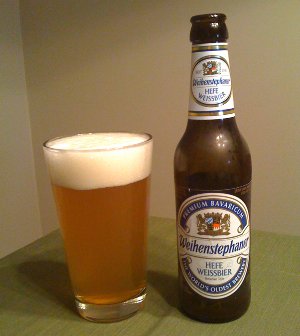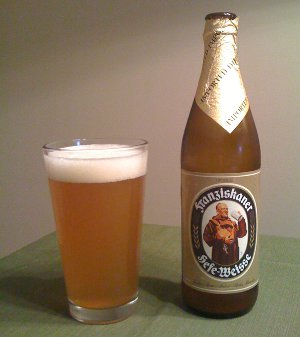- Dock Street The Great Pumpkin - Another pumpkin ale, this one somewhat more subdued in the alcohol and spice departments, which isn't really a bad thing, but which also doesn't really set this apart from any other pumpkin ale. Pretty standard stuff, though certainly something I could drink a few of... B- (Beer Nerd Details: 5.5% ABV on tap. Drank out of a half-pint glass.)
- Weyerbacher Harvest Ale - It's the time of year when hops are harvested and breweries grab a portion of fresh "wet hops" (normally hops are dried in order to preserve them) to make various hoppy styles (a practice that deserves a closer look on the blog at some point). This beer gave off a really fantastic hoppy aroma. It's a little on the earthy/grassy side, with just a little citrus peeking through. The taste was nice and bitter, with an almost spicy hop character to it. Perhaps this is just me buying into the hype, but it tasted fresh. It's not a face melter or a revelation or anything, but a well executed IPA. B (Beer Nerd Details: 6.2% ABV on tap. Drank out of a half-pint glass.)
- Leavenworth Boulder Bend Dunkelweizen - Not terribly familiar with the style, but it was kinda like a stout mixed with delicate wheat flavors. I have to say, I didn't really care for it. No off flavors or anything, it just wasn't working for me. Perhaps the roasty flavors were the cause of my issue, but whatever. I didn't have a problem drinking or finishing it, and it was certainly more interesting than a macro, but still not particularly inspiring. C (Beer Nerd Details: 4.7% ABV on tap. Drank out of a half-pint glass.)
- Theakston Old Peculier - I've always heard good things about this beer, but I must have gotten a bad bottle because I didn't care much for it and the flavors I got out of it don't seem to match up with much of the BA nerds' thoughts... I got a distinct apple aroma out of this, which is typically a sign of problems. I also got some raisins in both the aroma and taste. It wasn't undrinkable, but it wasn't particularly good either. D (though I may revisit it at some point). (Beer Nerd Details: 5.7% ABV bottled (12 oz). Drank out of a pint glass.)
- Innis And Gunn Oak Aged Beer - I had this the last time I went to the Whip as well, perhaps because it goes really well with one of the desserts. This time around, I got a better feel for the oak and caramel/toffee flavors in the beer and was quite pleased that I got another. So I will up this to a B+ (Beer Nerd Details: 6.6% ABV bottled (11.9 oz). Drank out of a half-pint glass.)
- Spaten Oktoberfestbier - I was going for a German Octoberfest beer; what I got was a skunked bottle of dishwater. Yes, it was in a green bottle, and it was bad. I couldn't get much out of this beer at all, and didn't finish it. This does kinda bring up the question of how to rate beers that are clearly defective, but in this case, it's all due to the green bottle choice, so I have no problem giving it an F. (Beer Nerd Details: 5.9% ABV bottled (12 oz). Drank out of a pint glass.)
Recently in Spaten-Franziskaner Category
As the weather warms and I begin to consider my next homebrew, I thought I should look into brewing something appropriate for summer, and of course the first thing that came to mind was wheat beers. Given my Belgian tendencies, you'd think I would gravitate towards a Belgian Witbier, but I also wanted to check out some Hefeweizens, as I've noticed that German beers are somewhat underrepresented on this blog.
Breaking down the style's name, "Hefe" is translated as "with yeast", meaning that the beer is unfiltered and will contain yeast (in fact, the spicy and unique yeast is key to the style), and "weizen" means "wheat". The difference between the Hefeweizen and the Belgian Witbier is that those wacky Belgians are always adding spices (like coriander and orange peel, amongst other, stranger, spices) whilst the Germans are very rigid in their brewing process. The original German Beer Purity Law (aka Reinheitsgebot or Bavarian Purity Law) limited the ingredients in beer to water, barley, and hops. This was later expanded to include wheat and, once it was discovered, yeast. The law was repealed over 20 years ago, but most German brewers are proud of their traditions and claim to still abide by it, even using it for marketing purposes. So no spices for the Germans.
I always find this sort of thing interesting though. Sometimes working within the box can be more rewarding or impressive than thinking outside the box. Using only the 4 annointed ingredients, the Germans are able to brew some really fantastic beer with a wide range of flavors and aromas. In a historical sense, this sort of purity law no doubt forced a lot of innovation within its boundaries while still retaining quality and consistency (two things that were much more difficult in the 16th century than they are today), and that's admirable. There's also something comforting and awe-inspiring about drinking a beer that is brewed in essentially the same way it was hundreds of years ago.
Of course, this isn't to say that thinking outside the box is a bad thing either, and indeed, I think that German brewers' lack of experimentation may be hurting them now that craft brewing has exploded in America. Indeed, even mainstream publications are catching on that German beer culture is in decline. As Charles Houston Decker notes: "...it's hard to look at a thriving American beer culture, a dying German one, and not pay attention to the obvious major difference between the two." It seems obvious to me that German beer culture won't vanish, and in some ways I kinda like that they're sticking to their guns and producing high quality beer according to their proud traditions. I think there's a lot of value in the basic fundamentals of beer brewing, and I'm glad someone has a different take on it than crazy Americans and Belgians. I'm always intrigued by these sorts of tensions: Oil and water, Democrat and Republican, John and Paul, American beer innovation and German tradition, and so on. It's important to have a variety of approaches to something like brewing, and while I probably prefer my crazy American beers to traditional German varieties, I'm glad both still exist.
Indeed, these traditional beers fit rather well with my recent "regular" beer kick, so here's a pair that I had a couple of weeks ago:

Weihenstephaner Hefeweissbier - Pours a cloudy yellowish gold with ample, fluffy head that laces like crazy as I drink. Smells of citrus and wheat, with lots of spicy yeastiness in there as well (cloves?). It's an almost Belgian style yeastiness, actually. Taste features a light wheaty sweetness with lots of spiciness and citrus thrown in for good measure. Mouthfeel is crisp, clean and well carbonated. Very refreshing. I can see why this is among the best wheat beers. While not exactly a face-melting brew, it's a pretty good example of what you can accomplish while working within the boundaries of the Reinheitsgebot. A-
Beer Nerd Details: 5.4% ABV bottled (12 oz). Drank out of a shaker pint glass. Drank on 3/18/11.

Franziskaner Hefe-Weisse: The name "Franziskaner" always conjures Young Frankenstein for me (along with the need to use weird emphasis in the pronunciation of the beer). It's almost identical in appearance to the Weihenstephaner, maybe a little darker. Definitely less head, and what is there doesn't last as long either. Smells very similar. Perhaps a little more in the spiciness realm, but it's very close. Taste is a little deeper. More sweet, less of what I'd call the wheat flavor, though it's still obviously a wheat beer. It's got a fuller body and more carbonation. It's still got the crisp and clean refreshing feel to it, but perhaps not as much as the Weistephaner. Very good, but not as well balanced as the Weihenstephaner. B+
Beer Nerd Details: 5% ABV bottled (500 ml). Drank out of a shaker pint glass. Drank on 3/18/11.
I have to admit that I enjoyed both of these better than my recent Belgian Witbiers, so it looks like my next homebrew will most likely be a Hefeweizen. It looks like Norther Brewer has a nice Bavarian Hefeweizen extract kit, though the OG is perhaps a bit lower than what I was looking for (that should be easily remedied though). Interestingly, it looks like the brewing process is a lot simpler than my previous beers: no specialty grains, only one hops addition, and ready to drink within 4 weeks.